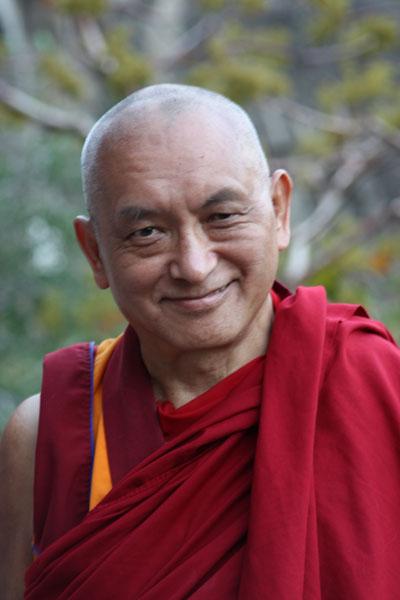Benefits of Taking Vows
Rinpoche gave the following advice to a student to explain some of the benefits of taking vows.

There is a reason why Buddha revealed three levels of teachings: Hinayana, Paramitayana, and Vajrayana, and that they contradict. It is like when a doctor advises, first of all, that a person stop eating meat and drinking alcohol when he or she is sick. Then, when the person recovers from the disease, the advice changes, depending on the person’s health. Therefore, the advice is contradictory, but not for the well-being of that person. So, too, with the three levels of teachings. Another reason why Buddha taught different levels of vows is because there are different levels of beings. Similarly, Buddha offered different levels of ordination.
In the Pratimoksha, seven negative actions are emphasized. In the bodhisattva path, a bodhisattva, with brave compassion, can go to the hell realms and exchange his or her happiness for the suffering of other beings. The Paramitayana texts prohibit drinking alcohol or eating meat, but in tantra, when you reach the level of the illusory body and clear light, drinking alcohol becomes a cause to see the clear light. When this level is reached, when there is no danger of your falling to the lower realms, it only becomes a cause to see the clear light and eliminate delusion and the subtle negative imprint which projects the inherently existent view. At that time, you practice the wisdom mother and drink alcohol, because it only benefits the yogi, and helps him or her to achieve enlightenment and to lead others to enlightenment.
So, a person takes the Pratimoksha vows and progresses until he or she does not find one single attraction in samsara, even in a dream. Then, upon that, bodhicitta is developed. Then, upon that, the gross and subtle generation stages and the completion stage are practiced. But if you haven’t reached the level of completion stage, and can’t use the wisdom mother and the great bliss for the clear light, then there is danger. Similarly, there is danger when you don’t have bodhicitta, you have self-cherishing thoughts, and you can’t remove the seed of subtle imprints. Then, you have to suffer and sentient beings have to suffer for so long. The more bodhicitta you have, the more realizations will come.
Denma Lochoë Rinpoche explained the following about taking vows. He said that if you have taken vows to refrain from committing certain actions and you abide by that, you receive benefits and merits. However, if you refrain from committing certain actions without having taken the vows, you do not accumulate the merit. For example, to be born as a human being you need the preliminary cause of pure morality. This means having taken vows in the past and living purely. Then, in the case of a perfect human rebirth, this means having practiced charity. To have the opportunity to practice tantra, and to attain enlightenment in one life (in highest yoga tantra, enlightenment is possible in three short years) comes from having practiced pure morality in the past. If we don’t take vows, then we don’t receive the benefit of abstaining from these actions, day and night, even when we’re asleep.
The minute we take the vows (until death for Pratimoksha vows, and until enlightenment for bodhisattva and tantric vows), day and night we collect merit all the time by living according to those vows. It is a cause to receive a good rebirth in your next life. If it is performed with renunciation, it becomes a cause to achieve liberation from samsara. If it is performed with bodhicitta, it becomes a cause for enlightenment. Then, day and night become a cause for enlightenment and to enlighten sentient beings. In the Mahayana practice, the goal is not just to achieve enlightenment yourself, but to lead all beings to enlightenment. Your goal is clear.
If a person is locked in a house alone and there are no insects in the house, he or she cannot kill anything. The person doesn’t commit the action. But that doesn’t mean the person creates the cause of a higher rebirth. However, if this person had taken the vow not to kill, then day and night he or she would create merit and progress on the spiritual path. By living according to vows, you have the freedom to practice the vows.
Worms and insects do not steal but they are not collecting merit. It is like a person in a coma or hibernating animals. They are not making their lives meaningful. But if the person in the coma has taken Pratimoksha, bodhisattva, or tantric vows, then in every second they are making their life meaningful.
So, it is not just about abstaining from negative actions. The higher training of morality is the basis for the higher training of concentration, which is the basis for the higher training of wisdom, which is the cause to purify samsara. Without that insight you can’t generate bodhicitta, and without that you can’t practice the tantric path and achieve enlightenment in one brief lifetime in this degenerate time.
Most worldly people base their lives around eating, sleeping, and getting married. They do not live according to vows. People who live according to vows collect merit all the time, collecting the cause for happiness in hundreds of thousands of lives. But without the vows, and if they have self cherishing thoughts, then they are continuously creating negative karma.

